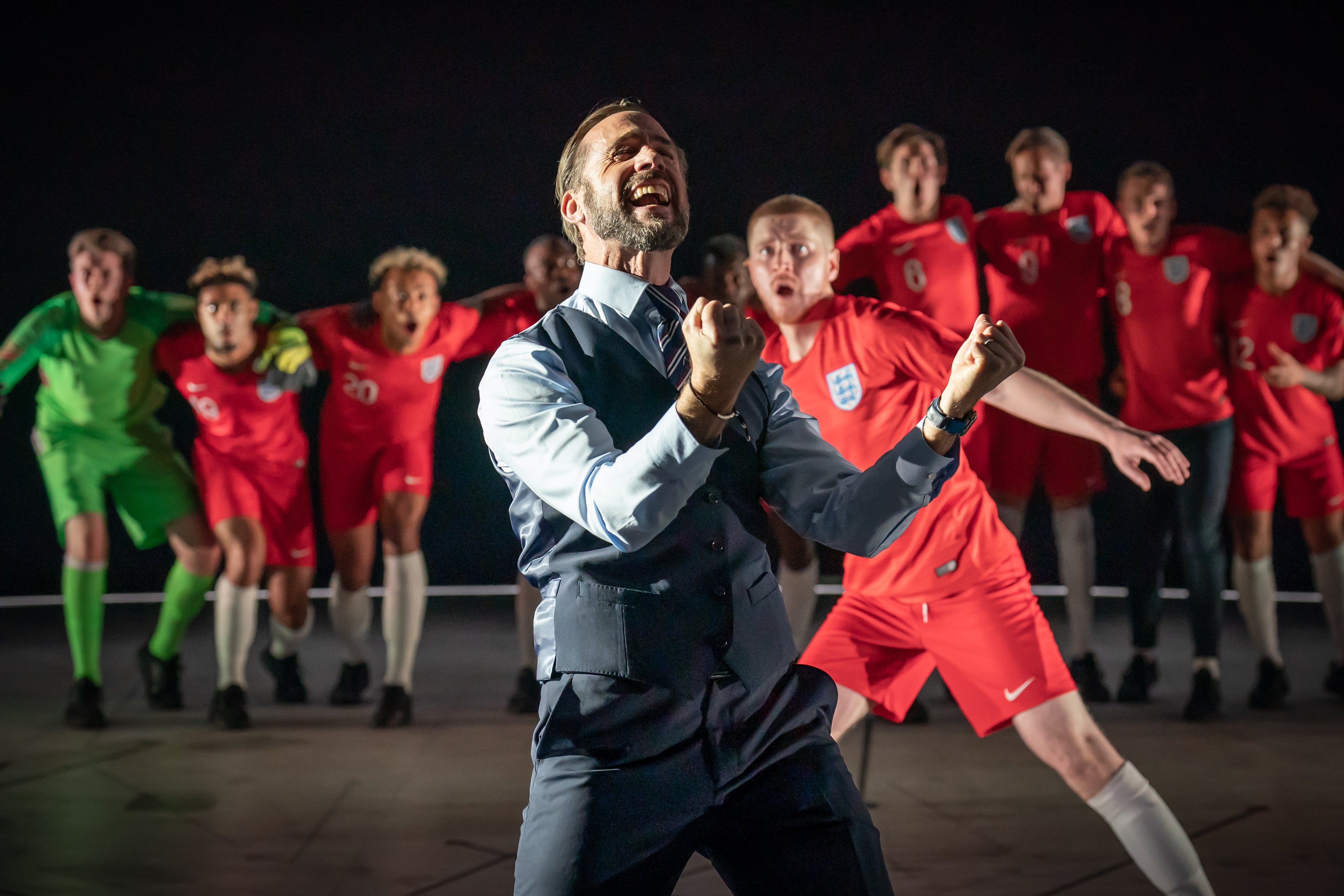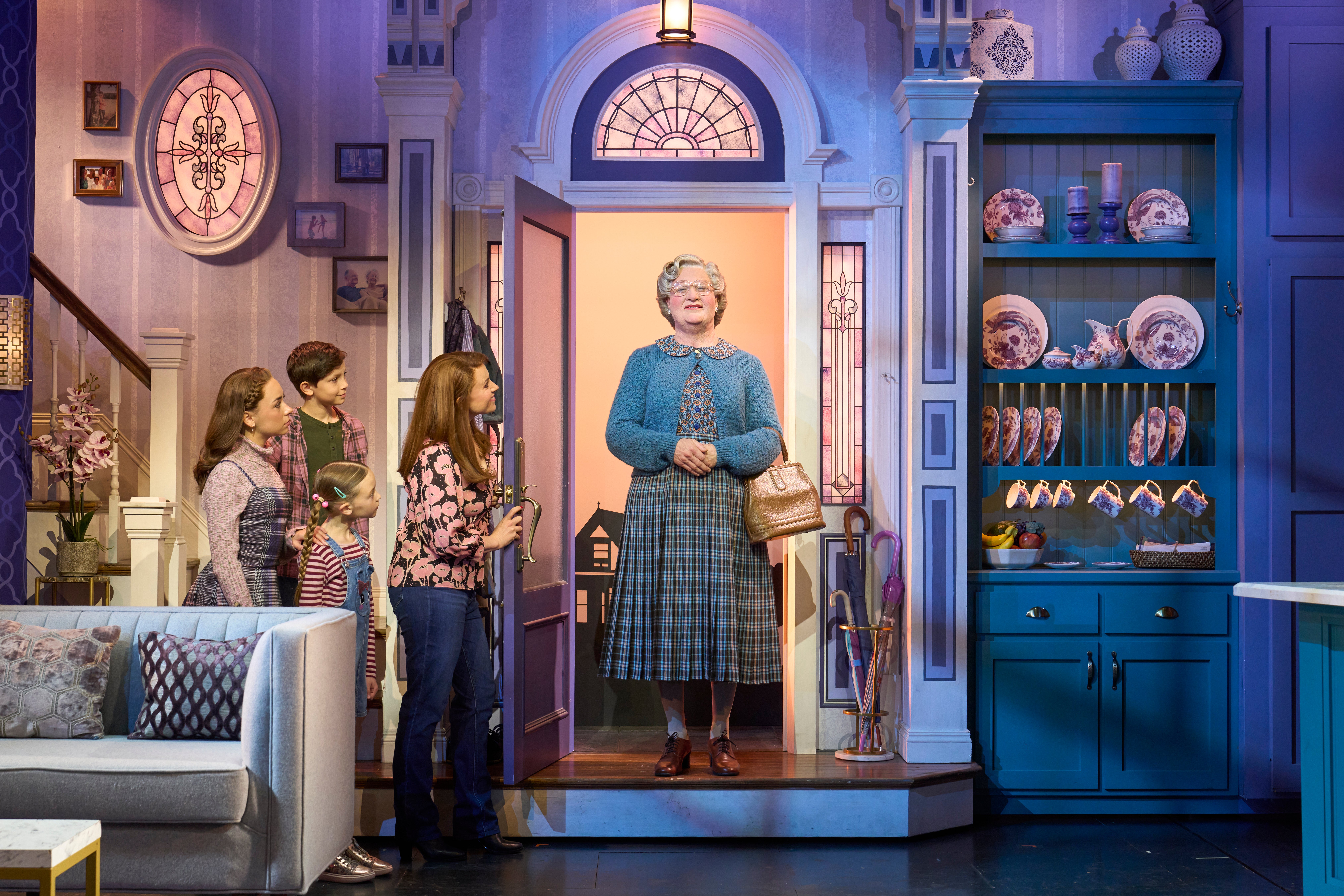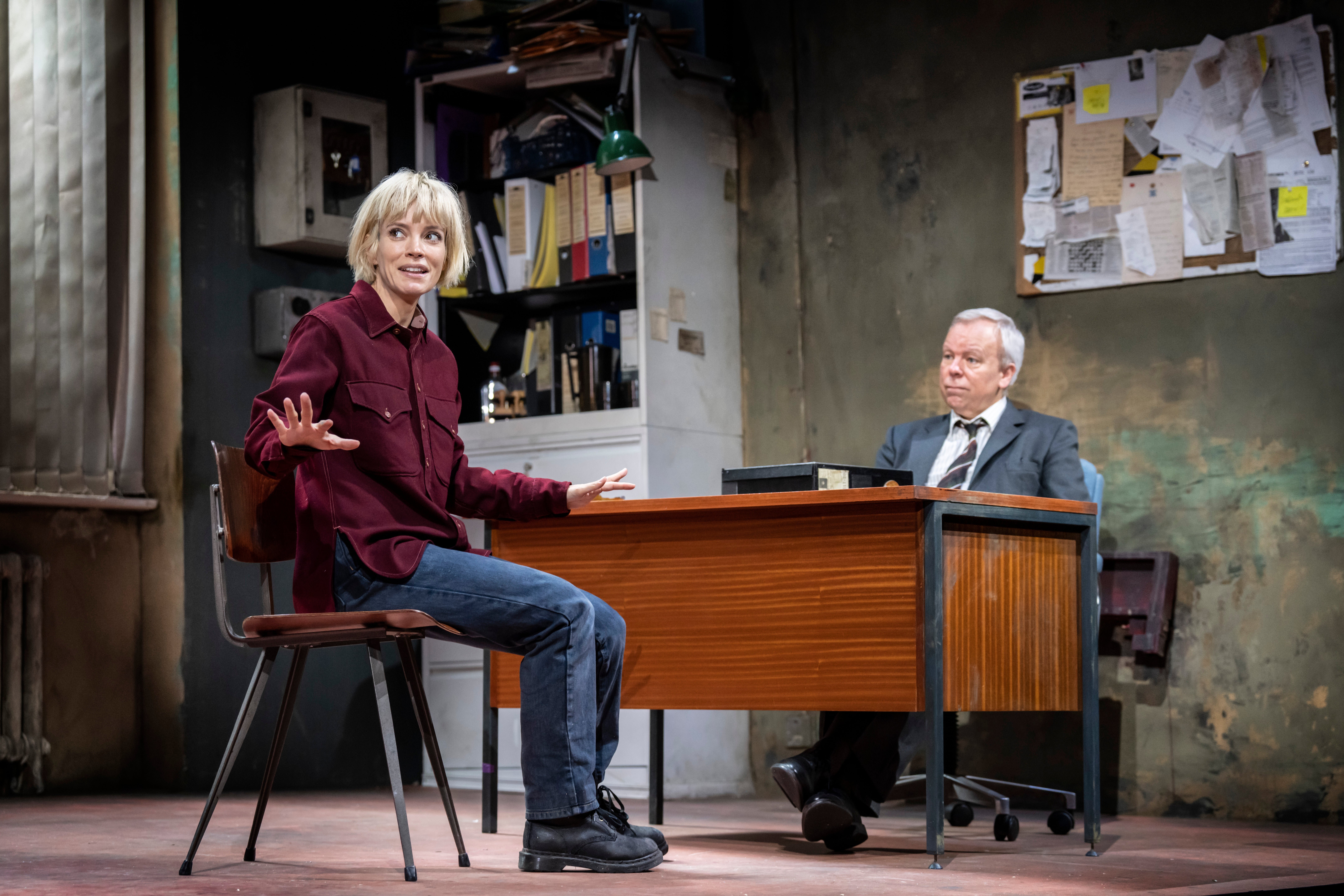The Week on Stage: From Dear England to Mrs Doubtfire
A guide to the week’s theatre

This week, Joseph Fiennes takes on the role of Gareth Southgate at the National, Lily Allen returns to the stage for a Martin McDonagh revival, and the musical adaptation of Mrs Doubtfire arrives in the West End.
Dear England – National Theatre ★★★☆☆
James Graham and director Rupert Goold have a track record for putting real-life events on stage in ways that are entertaining and insightful. Think of 2017’s Ink, which charted Rupert Murdoch’s acquisition of The Sun. Or last year’s Tammy Faye, an Olivier-winning musical about the eyeshadow-loving televangelist. Dear England kicks off (sorry) with Gareth Southgate (Joseph Fiennes) watching his younger self after his notorious Euro ‘96 semi-final penalty miss against Germany, before following his quest to change the culture of the England squad, which has long been beleaguered by high expectations and consistent failure. “I think we all have a problem with what it means to be England at the moment,” a thoughtful Southgate tells the cynical FA suits. He drops Rooney, picks a young, up-for-it new team, and hires Pippa Grange, a sports psychologist who will transform their mindset.
At almost three hours, Dear England is ambitious, but often overloaded by the sheer number of events since 2016. It covers three tournaments, but also three prime ministers and the pandemic; at one point, we see Theresa May grinding to Fat Les’s raucous 1998 football anthem “Vindaloo”. While Graham’s intention, to explore what the England team represent in the broader picture of our national identity, is an intriguing one, the play ends up giving us few new insights. Often it feels like a cut-and-paste job, a highlights package of the last few years, without the helter-skelter emotion of the beautiful game itself.

But Fiennes’s portrait of Southgate is remarkable: he captures the gentle head nods, the toothy smile that sometimes feels more like a grimace, the soft, nervy exterior hiding a steely inner resolve. But in Grange, played by Gina McKee, the Ted Lasso-ification of sport looms large. This is a world where the knotty issues of masculinity can be solved if men just hug each other more and write in their journals. Rather than being integrated properly into the action, she feels like a patronising, middle-class figure who tells us what we’re meant to think, saying things like, “until we are empowered, our fear will always limit us”. About penalty shootouts, she says, “collective trauma is real”.
Sometimes, DearEngland simply resorts to easy wins – colourful, lively singalongs to “Sweet Caroline”. Crowd-pleasing as they are, they’re jarring in a story that’s really about learning how to lose. A frustrating evening, then – like seeing your team put in a solid defensive performance but fail to get any shots on target. But, of course, we still believe. Jessie Thompson
Mrs Doubtfire – Shaftesbury Theatre ★★★☆☆
What is Mrs Doubtfire without Robin Williams? Big question. Back in 1993, the late comedy legend was able to transcend the family comedy genre, turning Chris Columbus’s film into a classic. Not even its dubious plot – in which father Daniel Hillard tricks his soon-to-be-ex-wife by pretending to be his kids’ new nanny, in order to earn joint custody – could stand in his way. Now, as Gabriel Vick steps into our titular nanny’s sensible brown shoes in Mrs Doubtfire, the musical, in the West End, the question of Mrs Doubtfire sans Williams is put to the test. The end product has some of the spark of the film, but fails to ever set fully alight.
Transposing the same story into a 2023 setting, Mrs Doubtfire, the musical, brings modern flourishes to this much-loved story. Peppered among the same old plot and quotes are of-the-moment jokes about Margot Robbie, Love Island and Boris Johnson. Although they get laughs, they feel at odds with the ultimately old-fashioned message of the original film.

In both the film and musical, the latter of which has been written by John O’Farrell, the audience is set up to root for Daniel. The adults around him (usually disapproving women) roll their eyes, but he’s great at impressions, cracks jokes and is adored by his kids (energetically played by Carla Dixon-Hernandez, Frankie Treadaway and Angelica-Pearl Scott at the show I attended). In the end, his ex-wife Miranda (Laura Tebbutt) reaches this conclusion too, realising that she should be more fun and less uptight like Daniel. But while Vick is a talented performer with strong comic timing and a malleable face, his Daniel is slightly too much of a petulant manchild to make us completely root for him. Eerie rubber mask on or off, he lacks Williams’ mercurial energy and likeability.
There are flashes of genius within this production. Take Lorin Latarro’s slick, referential choreography – it has no reason being this good, given the inconsequential nature of so many of the songs. The stronger numbers in Wayne and Karey Kirkpatrick’s libretto mimic more successful modern musicals: Kinky Boots, School of Rock, Book of Mormon. Unfortunately, they’re poor imitations, without the sharp comedy those shows do so well. “They always say the key to a solid marriage is laughter,” Daniel-as-Mrs-Doubtfire tells Miranda. Judge the musical by this same standard, and Mrs Doubtfire and the West End may be seeking their own separation too. Isobel Lewis
The Pillowman – Duke of York’s Theatre ★★★★☆
Is it finally The Pillowman’s time? Martin McDonagh may now be the Oscar-winning writer and director of films such as Three Billboards Outside Ebbing, Missouri and The Banshees of Inisherin, but there’s always been a sense of unfinished business with his dark 2003 play. Reviews were lukewarm when it opened at the National Theatre 20 years ago; even so, plenty today describe it as their favourite play without ever having seen it, and McDonagh thinks it’s his best work. This major West End production, starring Lily Allen in a gender-flipped lead role, is – surprisingly – the first major London revival since the premiere. What we find is a modern classic in waiting, ready to meet our current moment.
Katurian (Allen), a writer of twisted, violent short stories, finds herself being questioned by the police – without knowing why. In designer Anna Fleischle’s seedy backroom office, bruiser policemen Tupolski (Steven Pemberton) and Ariel (Paul Kaye) physically threaten and rage at her. Yes, the atmosphere is Kafkaesque, the stories like the Brothers Grimm on the heavy sesh. But these are knowing references in a play fascinated with the question of how we keep storytelling alive. Soon, we discover that a string of horrible child murders have recently taken place, closely resembling Katurian’s stories – a girl who had to swallow razor blades, a boy with all his toes chopped off – and the officers believe she and her brother Michal (Matthew Tennyson) are responsible. They both face execution, something she is prepared to accept if they assure her that her stories will be saved.

Having directed McDonagh’s last good play Hangmen in 2015 (we don’t speak about 2018’s A Very Very Very Dark Matter), Matthew Dunster is in tune with the playwright’s blacker-than-black humour. There’s much for audiences to find distasteful still – boxes of severed toes, children impaled on crucifixes, discussions of abuse, torture and suicide – but they have a heightened Grand Guignol quality. Katurian insists her stories have no message, to which Topolski retorts, “Some poor little kid gets f***ed up – that’s your theme.” And, as she argues against her work being read as a moral instruction, The Pillowman begins to feel like a case against a sanitised culture, one that fears ambiguity.
So Dunster’s revival is of an extraordinary play, given an almost great production. He directed Allen in her West End debut, 2:22 A Ghost Story, for which she received an Olivier nomination. Here, unfortunately, she feels limited, her performance one-note. Katurian was first played by David Tennant; Aaron Taylor-Johnson was originally cast here before the pandemic. I’m not convinced the gender flip works, but either way, Allen doesn’t give the role the same complexity as her more experienced castmates, which can feel frustrating. Pemberton and Kaye, though, are deliciously menacing and darkly funny as a pair of totalitarian police officers, hiding literary ambitions and a troubled past respectively, while Tennyson’s sing-song Michal gives us pathos. Early on, Katurian can’t remember whether telling a story is a storyteller’s first duty or only duty; whatever the answer, I’m glad this one’s being told again. JT






Join our commenting forum
Join thought-provoking conversations, follow other Independent readers and see their replies
Comments